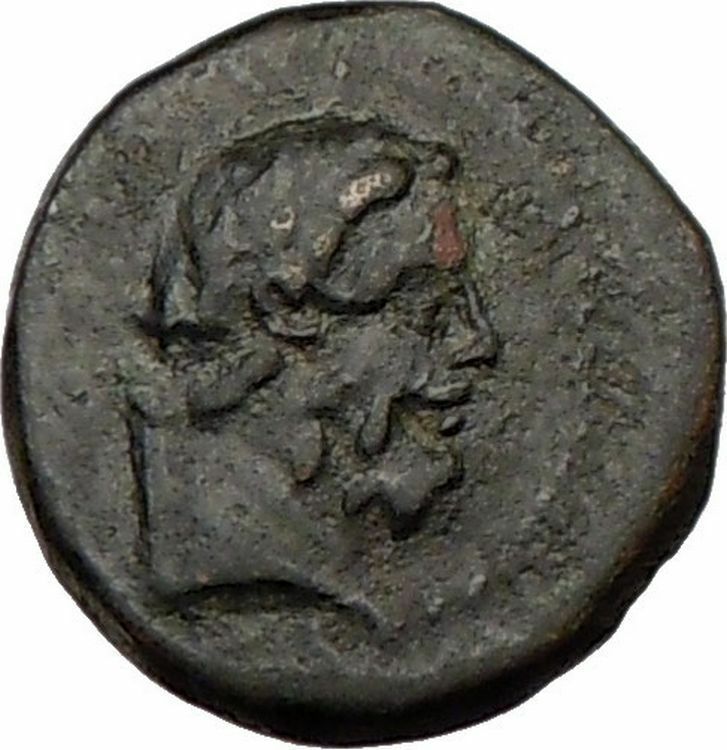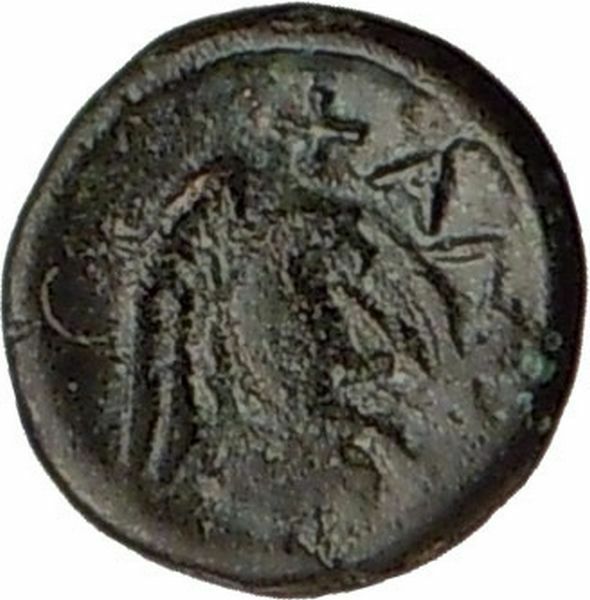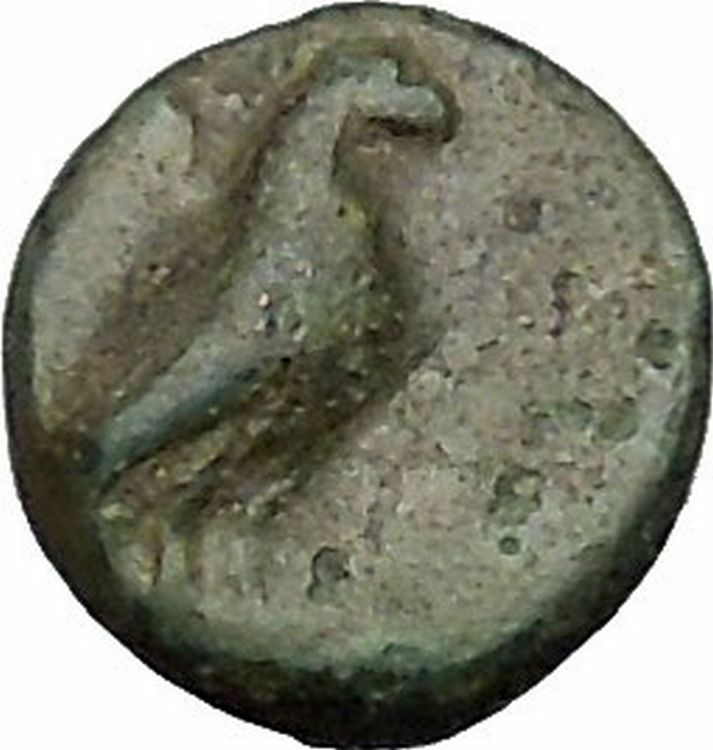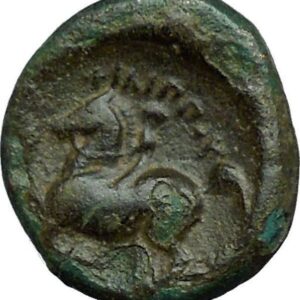|
Seleucid Kingdom
Demetrios III
, Philopater – King: 95-88 B.C.
Bronze 19mm (4.48 grams) Struck circa 95-88 B.C.
Reference: Sear 7194
His radiate head right.
Statue of naked Hermes standing left on pedestal, holding caduceus and palm; on
right, ΒAΣIΛΕΩΣ / ΔΗΜΗΤΡΙΟΥ / ΘΕΟY; on left ΦΙΛΟΠΑΤΟΡΟΣ / ΣΩTΗΡOΣ; monogram in
field to left.
You are bidding on the exact item pictured,
provided with a Certificate of Authenticity and Lifetime Guarantee of
Authenticity.
Hermes is the great messenger of the gods in
Greek mythology
and additionally as a
guide to
the Underworld
. Hermes was born on
Mount
Cyllene
in Arcadia. An
Olympian god
,
he is also the patron of boundaries and of the travelers who cross them, of
shepherds
and
cowherds
, of the
cunning
of thieves and liars, of orators and wit, of literature and poets, of athletics
and sports, of weights and measures, of invention, and of commerce in general.
His symbols include the tortoise, the rooster, the winged sandals, the winged
hat, and the caduceus
(given to him by Apollo in exchange for the lyre).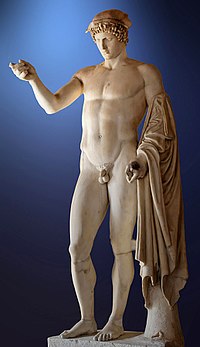
Symbols of Hermes were the palm tree, turtle, rooster, goat, the number four,
several kinds of fish, incense. Sacrifices involved honey, cakes, pigs, goats,
and lambs.
In the Roman adaptation of the Greek religion (see
interpretatio romana
), Hermes was identified with the Roman god
Mercury
, who, though inherited from the
Etruscans
, developed many similar characteristics, such as being the patron
of commerce.
The
Homeric hymn
to Hermes invokes him as the one “of many shifts (polytropos),
blandly cunning, a robber, a cattle driver, a bringer of dreams, a watcher by
night, a thief at the gates, one who was soon to show forth wonderful deeds
among the deathless gods.”
He protects and takes care of all the travelers, miscreants, harlots, old
crones
and
thieves that pray to him or cross his path. He is athletic and is always looking
out for runners, or any athletes with injuries who need his help.
Hermes is a messenger from the gods to humans, sharing this role with
Iris
.
An interpreter who bridges the boundaries with strangers is a hermeneus.
Hermes gives us our word “hermeneutics“,
the study and theory of interpretation. In Greek a lucky find was a hermaion.
Hermes delivered messages from Olympus to the mortal world. He wears shoes with
wings on them and uses them to fly freely between the mortal and immortal world.
Hermes was the second youngest of the
Olympian gods
, being born before
Dionysus
.
Hermes, as an inventor of fire, is a parallel of the
Titan
,
Prometheus
.
In addition to the lyre
,
Hermes was believed to have invented many types of racing and the sports of
wrestling and boxing, and therefore was a patron of athletes.
According to prominent
folklorist
Yeleazar
Meletinsky
, Hermes is a deified
trickster
.
Hermes also served as a
psychopomp
,
or an escort for the dead to help them find their way to the
afterlife
(the Underworld
in the Greek myths). In many Greek myths, Hermes was depicted as
the only god besides Hades
, Persephone
, Hecate
, and Thanatos
who could enter and leave the Underworld without hindrance.
Hermes often helped travelers have a safe and easy journey. Many Greeks would
sacrifice to Hermes before any trip.
In the fully-developed Olympian pantheon, Hermes was the son of
Zeus and the
Pleiade
Maia
,
a daughter of the Titan
Atlas
.
Hermes’ symbols were the
cock
and the
tortoise
,
and he can be recognized by his purse or pouch,
winged sandals
,
winged cap
, and the herald’s staff, the
kerykeion
. The night he was born he slipped away from Maia and stole his
elder brother Apollo
‘s cattle.
Demetrius III (d. 88 BC), called Eucaerus (“well-timed”
possibly a misunderstanding of the derogative name Akairos, “the untimely
one”) and Philopator, was a ruler of the
Seleucid kingdom
, the son of
Antiochus VIII Grypus
.
By the assistance of
Ptolemy IX Lathyros
, king of Egypt, he recovered part of his father’s
Syrian
dominions
ca 95 BC, and held his court at
Damascus
,
from where he tried to enlarge his dominions. To the south he defeated the
Maccabean
king
Alexander Jannaeus
in battle, but the hostility of the
Jewish population
forced him to withdraw. While attempting to dethrone his brother,
Philip I Philadelphus
, he was defeated by the
Arabs
and Parthians
, and taken prisoner. He was kept in confinement in Parthia by
Mithridates II
until his death in 88.
|
Born:
Unknown
Died:
88 BC |
| Preceded by
Seleucus VI Epiphanes
|
Seleucid King
95 BC
with
Antiochus X Eusebes
Antiochus XI Epiphanes
Philip I Philadelphus
|
Succeeded by
Philip I Philadelphus
or
Antiochus XII Dionysus
|
Seleucid
Empire
Σελεύκεια
Seleúkeia |

|
312 BC–63 BC |
↓
|
|
|
The Seleucid Empire in 301 BC.
|
The Seleucid Empire
was a
Hellenistic
state ruled by the Seleucid dynasty
founded by
Seleucus I Nicator
following the division of
the empire created by
Alexander the Great
. Seleucus received
Babylonia
and, from there, expanded his
dominions to include much of Alexander’s
near eastern
territories. At the height of its
power, it included central
Anatolia
, the
Levant
,
Mesopotamia
,
Kuwait
,
Persia
,
Afghanistan
,
Turkmenistan
, and northwest parts of
India
.
The Seleucid Empire was a major center of
Hellenistic
culture that maintained the
preeminence of
Greek
customs where a Greek-Macedonian
political elite dominated, mostly in the urban areas. The Greek population of
the cities who formed the dominant elite were reinforced by emigration from
Greece
. Seleucid expansion into
Anatolia
and Greece was abruptly halted after
decisive defeats
at the hands of the
Roman army
. Their attempts to defeat their old
enemy
Ptolemaic Egypt
were frustrated by Roman
demands. Much of the eastern part of the empire was conquered by the
Parthians
under
Mithridates I of Parthia
in the mid-2nd century
BC, yet the Seleucid kings continued to rule a
rump state
from
Syria
until the invasion by
Armenian
king
Tigranes the Great
and their ultimate overthrow
by the Roman
general
Pompey
.
|







